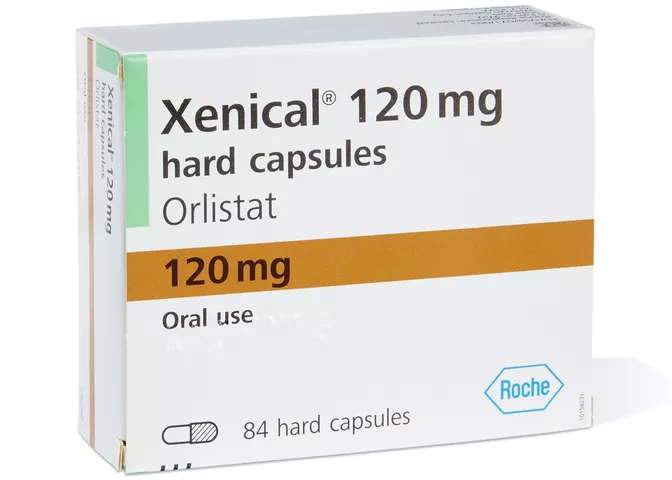Orlistat (Xenical) is a drug, a specific inhibitor of gastrointestinal lipases, which carry out fat digestion. It is best known under the trade names Xenical, Roche (company) and Orsothen. It is used, among other things, as a means of weight loss.
Mechanism of action
The drug is highly lipophilic and mixes with fat droplets. Orlistat covalently binds to the active center of pancreatic and gastric lipases, thus inactivating them. Due to the inhibition of gastrointestinal lipases, triglycerides cannot penetrate into the bloodstream. This creates an energy deficit, which leads to the mobilization of fat from the depot. Under the influence of xenical, mainly the mass of visceral-abdominal fat decreases. Orlistat also helps to decrease hypercholesterolemia: free fatty acids and monoglycerides decrease in the intestinal lumen, cholesterol solubility decreases, which reduces its ability to penetrate into the blood. Due to the normalization of blood lipid composition, the sensitivity of tissues to insulin increases and hyperinsulinemia decreases, which also contributes to the reduction of visceral and abdominal fat mass.
Studies
According to multicenter placebo-controlled trials, after 52 weeks of standard-dose xenical, body weight was reduced by 6.2% of baseline, and insulin levels were reduced by 18%.
In 60% of obese patients orlistat reduced weight by more than 10% and significantly reduced waist volume. A significant reduction in body weight was achieved both in patients with normal carbohydrate metabolism and in patients with type 2 diabetes. Orlistat confirmed its high efficacy and safety in a large number of randomized placebo-controlled trials, the longest of which was the XENDOS study (4 years of continuous treatment with xenical).
In phase 3 clinical trials, orlistat was found to reduce triglycerides, total cholesterol, low-density lipoproteins, glycated hemoglobin, and lower blood pressure.

Use for weight loss
Xenical is prescribed 120 mg 3 times daily with a meal or within 1 hour after a meal.
Side effects
Gastrointestinal side:
- increased frequency of defecation – 20.4%
- oily discharge from the anus – 17.5%
- flatulence – 23.9%
- fecal incontinence 7,7%
Gastrointestinal side effects are caused by high fat content in food. According to statistical data, 8.8% of patients stop taking this medicine because of these side effects. To prevent the occurrence of these phenomena, it is necessary to stick to a moderate hypocaloric diet containing no more than 30% of fat (of the total daily calorie). In this case, these side effects are not observed. Also during the first 1-4 weeks of taking the drug, side effects on the nervous system are observed:
- headache – 30%
- dizziness – 5%
- insomnia – 3.9%
- anxiety – 4,7%







